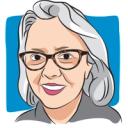
Sometimes breast cancer invites us to look closely at our own bodies the way we might look at famous nudes. Creating visual art can be therapeutic, whether it involves photography or digital. Watercolors, sketches and collages could be empowering, too.
